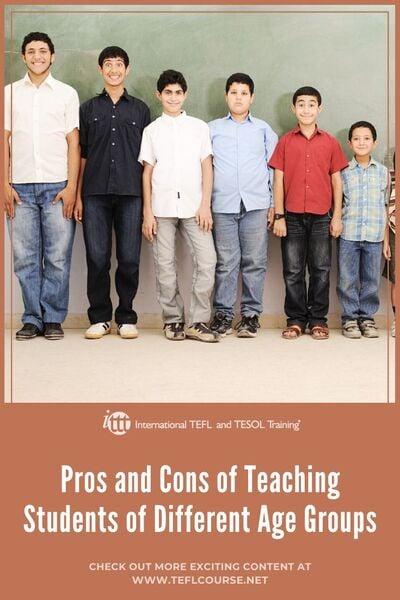Pros and Cons of Teaching Students of Different Age Groups: Adults vs. Youngsters

What are the pros and cons of teaching a language to adults and young learners? First of all, let us talk about learner groups. Adults are people 18 years of age and more and young learners are split into three groups: over 13, from 8 to 12, and under 7.
Table of Contents
When do language abilities start to form?
However, on the other hand, teaching a language to adults is easier
Do you want to teach English abroad? Take a TEFL course!
This post was written by our TEFL certification graduate Phuong V. Please note that this blog post might not necessarily represent the beliefs or opinions of ITTT.
When do language abilities start to form?
Obviously, the language is formed not only when we are born but partly during pregnancy. A baby in a womb can listen to sounds outside and when its mother talks to her baby every day, it can also feel touches and sweet words from its mother. The baby starts speaking by listening to and copying whatever its parents, grandparents, and other people say. That is a natural way to learn a language. Because of natural learning, the first advantage when teaching young learners is that children easily absorb the language from the context, not only one but more than one language. Therefore, the first three years of a child's is considered as the "gold" period for his or her development physically and mentally. In the meanwhile, teaching a language to adults requires great effort from both teachers and learners because the older they get, the harder they learn.
Secondly, children are very curious about everything. That is why they continuously ask the question "why is that so?" because anything new and fun easily draws their attention. They are ready and open-minded to experience new ways of teaching while adults with previous learning experience might not be willing to learn a new teaching method.
Thirdly, children are usually not afraid of speaking in which adults are always. The more the age is, the more nervous they get. That is the fear of losing face, making mistakes, and the pressure of success makes adults feel hard to speak out. As a result, their confidence decreases.

Also Read: Living and Teaching English in Japan - Habits, Customs & Curiosities
However, on the other hand, teaching a language to adults is easier
Firstly, adults have obvious motivations to attend classes while children go to language classes because of their parents' wishes. There are many different reasons for that such as for interest in languages, for purposes of moving and living in an English speaking country, for working in an international company, for traveling or for improving grades at school and so on. With their motivations and self-responsibility, adults have greater attention to their study so they are usually more hard-working and serious in the class while children are quite active and they can have some behavior problems if teachers are not strict or do not have disciplines.
Another advantage of teaching adults is that they have life experience which can be brought into the class to make fun, creative, and colorful conversations, discussion, and activities. It can help the teacher to establish a rapport with learners which makes them closer to each other and willing to share their difficulties in learning. When the teacher understands what the learners needs, their lessons will be more interesting and suitable.
Also Read: What's the best way to apply for TEFL job?
Advantages and disadvantages
In short, teaching a language to adults or young learners also have advantages and drawbacks. Based on each target's psychology, teachers will have proper behavior manners and should prepare their lesson plans seriously and carefully with varying activities and combine with teaching skills using EFL in the class appropriately. What are the pros and cons of teaching a language to adults and young learners? First of all, let us talk about learner groups. Adults are people 18 years of age and more and young learners are split into three groups: over 13, from 8 to 12, and under 7.
Obviously, the language is formed not only when we are born but partly during pregnancy. A baby in a womb can listen to sounds outside and when its mother talks to her baby every day, it can also feel touches and sweet words from its mother. The baby starts speaking by listening to and copying whatever its parents, grandparents, and other people say. That is a natural way to learn a language. Because of natural learning, the first advantage when teaching young learners is that children easily absorb the language from the context, not only one but more than one language. Therefore, the first three years of a child's is considered as the "gold" period for his or her development physically and mentally. In the meanwhile, teaching a language to adults requires great effort from both teachers and learners because the older they get, the harder they learn.
Secondly, children are very curious about everything. That is why they continuously ask the question "why is that so?" because anything new and fun easily draws their attention. They are ready and open-minded to experience new ways of teaching while adults with previous learning experience might not be willing to learn a new teaching method.
Also Read: TEFL jobs in Japan
Thirdly, children are usually not afraid of speaking in which adults are always. The more the age is, the more nervous they get. That is the fear of losing face, making mistakes, and the pressure of success makes adults feel hard to speak out. As a result, their confidence decreases.
However, on the other hand, teaching a language to adults is easier. Firstly, adults have obvious motivations to attend classes while children go to language classes because of their parents' wishes. There are many different reasons for that such as for interest in languages, for purposes of moving and living in an English speaking country, for working in an international company, for traveling or for improving grades at school and so on. With their motivations and self-responsibility, adults have greater attention to their study so they are usually more hard-working and serious in the class while children are quite active and they can have some behavior problems if teachers are not strict or do not have disciplines.
Another advantage of teaching adults is that they have life experience which can be brought into the class to make fun, creative, and colorful conversations, discussion, and activities. It can help the teacher to establish a rapport with learners which makes them closer to each other and willing to share their difficulties in learning. When the teacher understands what the learners needs, their lessons will be more interesting and suitable.
Do you want to teach English abroad? Take a TEFL course!
In short, teaching a language to adults or young learners also have advantages and drawbacks. Based on each target's psychology, teachers will have proper behavior manners and should prepare their lesson plans seriously and carefully with varying activities and combine with teaching skills using EFL in the class appropriately.
Apply now & get certified to teach english abroad!
Speak with an ITTT advisor today to put together your personal plan for teaching English abroad.
Send us an email or call us toll-free at 1-800-490-0531 to speak with an ITTT advisor today.
Related Articles:
- Step-By-Step Guide To Legally Teaching English in Japan
- Teaching English in Japan - Alumni Report by Gabriella S.
- The 10 Best Destinations for Teaching English Abroad in 2018
- The Best Government Programs For Teaching English Abroad
- The Top 5 Places to Teach English in Japan
- How much can I earn teaching English in Japan?




